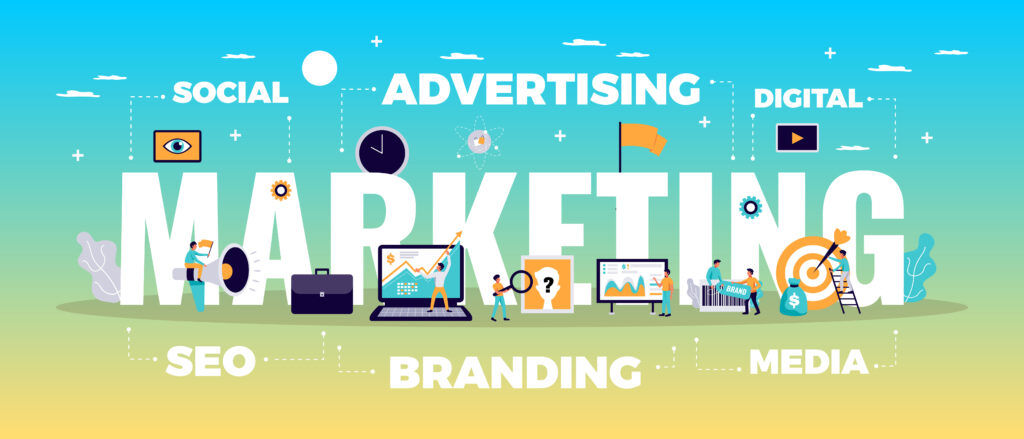Are you a small business owner looking to level up your digital marketing game? Look no further! In this article, we will uncover 7 game-changing digital marketing strategies that can help take your small business to new heights.
In today’s fast-paced digital landscape, it’s essential for small businesses to embrace effective marketing techniques to effectively reach and engage their target audience. Whether you’re just starting out or looking to revamp your existing strategy, these game-changing strategies will give you the competitive edge you need.
From optimizing your website for search engines and creating engaging content to leveraging the power of social media and harnessing the potential of email marketing, we’ve got you covered. We’ll also dive into the importance of local SEO and the impact of video marketing on your overall digital presence.
By implementing these strategies, you’ll not only increase your brand visibility but also drive more traffic, generate leads, and convert them into loyal customers. Get ready to transform your small business with these 7 digital marketing game-changers.
The importance of digital marketing strategies for small businesses
Digital marketing has become an essential tool for small businesses in today’s highly competitive marketplace. With the majority of consumers turning to the internet to research products and services before making a purchase, having a strong online presence is crucial for success.
One of the main advantages of digital marketing is its cost-effectiveness compared to traditional marketing channels. Small businesses often have limited budgets, and digital marketing allows them to reach a wider audience without breaking the bank. Additionally, digital marketing provides measurable results, allowing small businesses to track their return on investment (ROI) and make data-driven decisions.
Another key benefit of digital marketing is its ability to target specific audiences. Through various digital channels, such as social media platforms and search engines, small businesses can reach their target audience based on demographics, interests, and behaviors. This targeted approach ensures that marketing efforts are directed towards those most likely to convert into customers.
In today’s digital age, where consumers are constantly bombarded with advertisements, digital marketing allows small businesses to cut through the noise and stand out from the competition. By implementing effective strategies, small businesses can build brand awareness, establish credibility, and foster customer loyalty.
Understanding your target audience
Before diving into any digital marketing strategy, it’s essential to have a deep understanding of your target audience. Knowing who your ideal customers are will help you tailor your marketing efforts to resonate with them effectively.
Start by conducting market research to gather insights about your target audience’s demographics, interests, and pain points. This information will help you create buyer personas, which are fictional representations of your ideal customers. By understanding their needs, motivations, and challenges, you can craft marketing messages that resonate with them on a deeper level.
Additionally, utilize analytics tools to gather data about your website visitors, social media followers, and email subscribers. These insights will provide valuable information about their behaviors, preferences, and interactions with your brand. Use this data to refine your marketing strategies and create personalized experiences for your audience.
Remember, understanding your target audience is an ongoing process. Regularly analyze data, conduct surveys, and engage with your customers to stay up-to-date with their evolving needs and preferences. This continuous understanding will allow you to adapt your marketing strategies and stay ahead of the competition.
Search engine optimization (SEO) for small businesses
Search engine optimization (SEO) is the process of optimizing your website to rank higher in search engine results pages (SERPs). This is crucial for small businesses as higher visibility in search engines leads to increased organic traffic and brand exposure.
Start by conducting keyword research to identify the keywords and phrases that your target audience is using to search for products or services similar to yours. Use these keywords strategically in your website’s content, meta tags, and URLs to improve your chances of ranking higher in relevant search queries.
Another important aspect of SEO is optimizing your website’s structure and navigation. Ensure that your website is mobile-friendly, has fast loading times, and provides a seamless user experience. Search engines prioritize websites that are user-friendly and provide valuable content, so invest in creating high-quality and engaging content that resonates with your target audience.
Building backlinks from reputable websites is another effective SEO strategy. Reach out to industry influencers, bloggers, and publications to guest post or collaborate on content. These backlinks will not only drive referral traffic but also signal to search engines that your website is trustworthy and authoritative.
Regularly monitor your website’s performance using analytics tools and make necessary optimizations based on the data. SEO is an ongoing process, and staying up-to-date with the latest algorithm changes and industry trends will ensure that your website maintains its visibility in search engine results.
Pay-per-click (PPC) advertising for small businesses
Pay-per-click (PPC) advertising is a highly effective digital marketing strategies for small businesses looking to increase brand visibility and drive targeted traffic to their websites. Unlike traditional advertising, PPC allows you to pay only when someone clicks on your ad, making it a cost-effective option.
Start by identifying the platforms where your target audience spends their time, whether it’s search engines like Google or social media platforms like Facebook or Instagram. Each platform offers its own PPC advertising options, such as Google Ads or Facebook Ads, which allow you to create and target ads based on specific demographics, interests, and behaviors.
When creating PPC ads, focus on creating compelling ad copy that resonates with your target audience and includes relevant keywords. Use eye-catching visuals and compelling calls-to-action to encourage clicks and conversions. Monitor the performance of your ads closely and make necessary adjustments to optimize your campaigns.
In addition to driving traffic to your website, PPC advertising also provides valuable data and insights about your audience’s preferences and behaviors. Utilize this data to refine your targeting and optimize your overall marketing strategy.
Content marketing for small businesses
Content marketing is a powerful strategy for small businesses to establish thought leadership, build trust with their audience, and drive organic traffic to their website. By creating valuable and relevant content, you can position your brand as an authority in your industry and attract potential customers.
Start by identifying the topics and themes that are relevant to your target audience. Conduct keyword research to uncover the keywords and phrases that your audience is searching for. Use these keywords strategically in your content to improve its visibility in search engine results.
When creating content, focus on providing value to your audience. Whether it’s informative blog posts, engaging videos, or helpful tutorials, ensure that your content educates, entertains, or solves a problem for your audience. This will not only attract new visitors but also keep them coming back for more.
Promote your content through various channels, such as social media, email newsletters, and industry publications. Encourage your audience to share your content by making it easily shareable and engaging. Building a strong content marketing strategy takes time and consistency, but the long-term benefits are worth it.
Social media marketing for small businesses
Social media marketing is a game-changer for small businesses, providing a platform to connect and engage with their target audience on a personal level. With billions of users active on social media platforms, leveraging their power can significantly boost brand awareness and drive traffic to your website.
Start by identifying the social media platforms that your target audience frequents the most. Whether it’s Facebook, Instagram, Twitter, or LinkedIn, each platform offers unique features and demographics. Create compelling profiles and optimize them with keywords and visuals that align with your brand.
Develop a content strategy that aligns with your audience’s interests and preferences. Create a mix of engaging content, including images, videos, infographics, and blog posts. Encourage audience interaction by asking questions, running contests, or hosting live Q&A sessions. This will not only increase engagement but also foster a sense of community around your brand.
Utilize social media advertising options to reach a wider audience and drive targeted traffic to your website. Each platform offers its own advertising features, allowing you to target specific demographics, interests, and behaviors. Monitor the performance of your social media campaigns and make necessary adjustments to optimize your results.
Email marketing for small businesses
Email marketing is a highly effective digital marketing strategies for small businesses to nurture relationships with their audience, generate leads, and drive conversions. With a high return on investment (ROI), email marketing allows you to deliver personalized messages directly to your audience’s inbox.
Start by building an email list of subscribers who have opted in to receive communications from your brand. Offer incentives, such as exclusive discounts or valuable content, to encourage sign-ups. Segment your email list based on demographics, purchase history, or engagement levels to deliver targeted and relevant content.
When creating email campaigns, focus on providing value to your subscribers. Whether it’s informative newsletters, personalized product recommendations, or exclusive offers, ensure that your emails are tailored to your audience’s needs and interests. Use compelling subject lines and engaging visuals to capture their attention and encourage open rates.
Regularly analyze the performance of your email campaigns, such as open rates, click-through rates, and conversion rates. Use this data to refine your email marketing strategy and make necessary optimizations. Experiment with different types of emails, such as welcome emails, abandoned cart emails, or re-engagement emails, to maximize your results.
Influencer marketing for small businesses
Influencer marketing has become a popular and effective digital marketing strategies for small businesses to reach their target audience through trusted and influential individuals. By collaborating with influencers who align with your brand values and have a dedicated following, you can amplify your brand’s reach and credibility.
Start by identifying influencers in your industry or niche who have a strong online presence and engaged followers. Research their audience demographics, engagement rates, and previous collaborations to ensure they are the right fit for your brand. Reach out to them with a personalized proposal detailing how you can collaborate and the benefits they will receive.
When working with influencers, focus on creating authentic and valuable content that resonates with their audience. Whether it’s sponsored social media posts, guest blog posts, or product reviews, ensure that the content feels natural and aligns with the influencer’s style and voice. Monitor the performance of the collaborations and track key metrics, such as reach, engagement, and conversions.
Remember, influencer marketing is not just about the number of followers an influencer has but also the quality and relevance of their audience. Focus on building long-term relationships with influencers who genuinely connect with your brand and can become brand ambassadors.
Implementing these 7 game-changing digital marketing strategies can significantly transform your small business and help you achieve your marketing goals. From optimizing your website for search engines and creating engaging content to leveraging the power of social media and harnessing the potential of email marketing, these strategies offer a holistic approach to digital marketing success.
Remember, digital marketing is an ongoing process that requires consistent effort and adaptation. Regularly analyze your data, monitor industry trends, and stay up-to-date with the latest digital marketing techniques. By continuously refining your strategies and staying ahead of the curve, you can ensure that your small business thrives in the ever-evolving digital landscape.
So, what are you waiting for? It’s time to level up your digital marketing game and take your small business to new heights! Implement these game-changing strategies, and watch as your brand visibility, website traffic, and customer base soar. Get ready for success in the digital age!


Nice Post mann